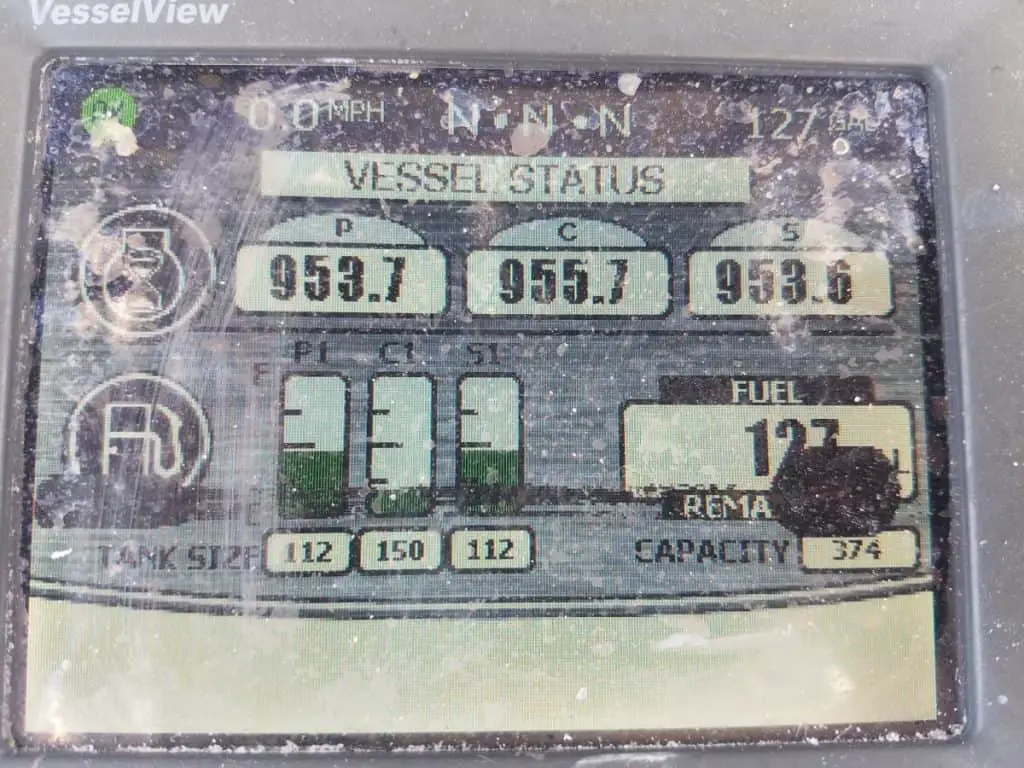If you’ve been around boats for a little while. Then you have probably heard about engine hours. You might be asking what they mean and:
How Do You Check Boat Engine Hours? Engine hours can be checked by looking at the hour meter for older engines. Engines built in the last 20 years will store the hours on the engine computer and can be read via the gauge or a diagnostic computer.
Here is everything that you need to know about how to check for the engine’s hours and what they mean for you and tell you about the engine!
How Does A Boat Hour Meter Work?
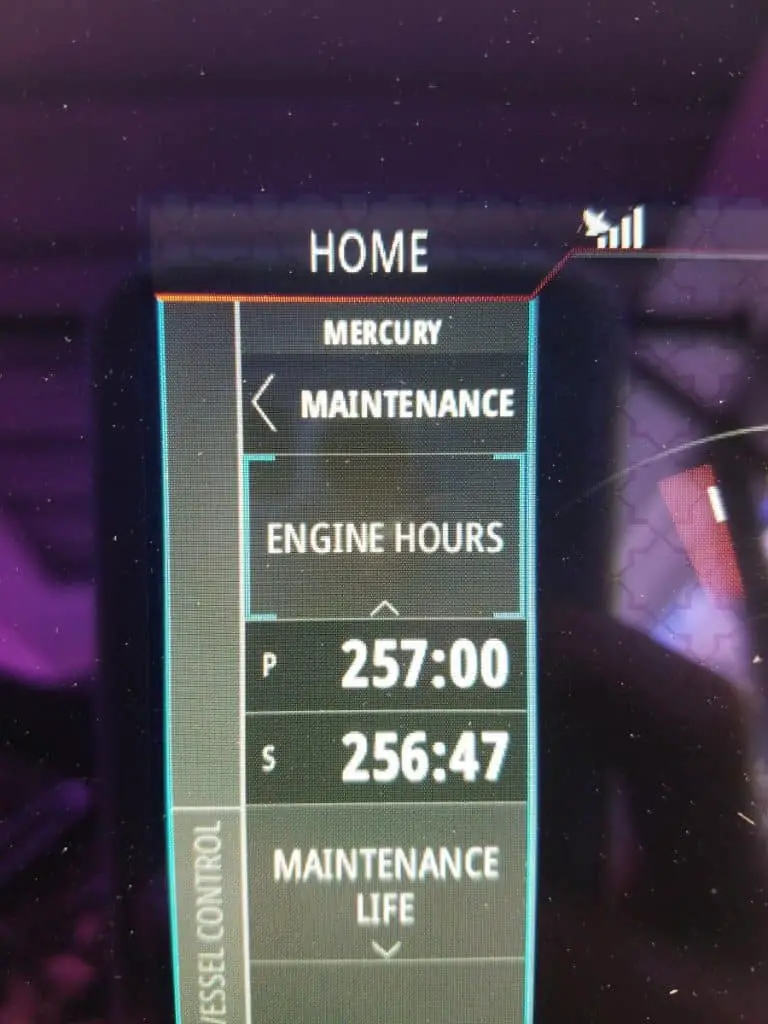
Almost all outboard engines that have been produced since the year 2000. Have the capability of storing engine hours.
Yes, originally, and on engines that have been manufactured before then. You have to rely on the hour meter that is on the console. These are not really accurate though.
The way that the hour meter on console operates, is that it runs from the voltage that is supplied to it. This voltage comes from the key switch, which means. That every time the key switch is on, the hour meter is running.
Regardless of whether the engine is running or not!
This can become very vague, and not very accurate though. How many times was the key switch left on at the sand bar? On the trailer, at the ramp, on the dock, while getting fuel?
The possibilities that the hours are accurate are not very high. Seeing that the hour meter only really reads the amount of time the key was on.
If the gauge is replaced, then all the hours are reset and it’s back to zero! So there is no way of “really” telling how many hours an engine has. Just by going off of the hour meter on the boat.
How To Check Engine Hours On Yamaha, Mercury, Honda, Evinrude, Suzuki Outboards!
This is why the beauty of the engines made since the year 2000 is so nice. The engine itself stores the engine hours on the computer on the engine!
Which means that we can figure out exactly how many hours the engine has run for! We can also see at what RPM’s the engine was run at and for how long!
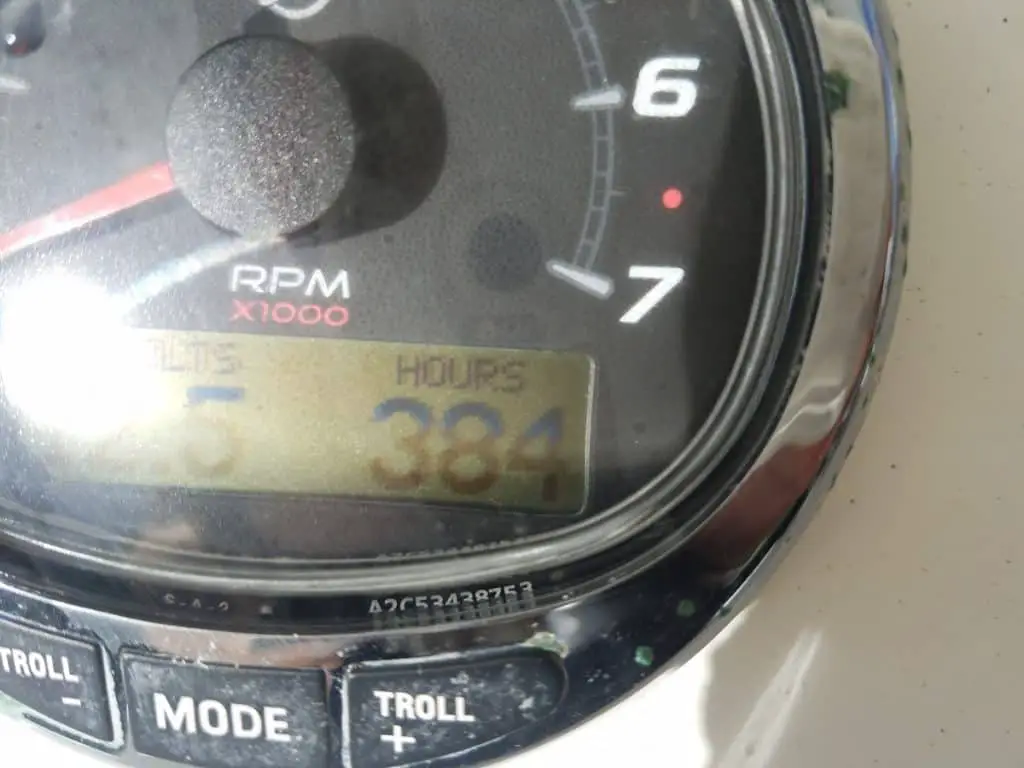
On all of the manufacturers, Yamaha, Mercury, Honda, Evinrude, or Suzuki outboards. The engine hours can be found on the gauges on the console.
You can easily navigate to displaying the hours by hitting the mode button for most gauges.
There is one kicker though, on some of the manufacturers, like Yamaha, the engine hours were still tracked by the physical gauge. So, for most of the early and up until a few years ago.
If you changed the gauge on the boat, then the hours would be reset and you wouldn’t know how many hours were really on the engine. Unless you hooked the engine up to a computer and read them that way.
So, in the end, to get the most accurate engine hours, you will want to hook the engine up to a computer. Using the manufacturer diagnostic software, you can log into the computer on the engine.
And get the exact number of hours that are on the engine! Without the computer, just be aware of the possibility of the hours being incorrect for certain engines.
Now, what exactly do these hours tell us about the engine though?
Is 200, 400, 500, 700 Hours A Lot For A Boat?
When it comes to the engine hours on a boat. There are a lot of variables to remember.
I want to make sure and put this in here because it isn’t really about the number. Whether it is 200, 400, 500, 700, or even thousands! The number is only half of the story.
The age of the engine plays just as much a part in the overall health of the engine. If you are looking at a 30-year-old engine that only has 150 hours on it. Is it a good, reliable engine?
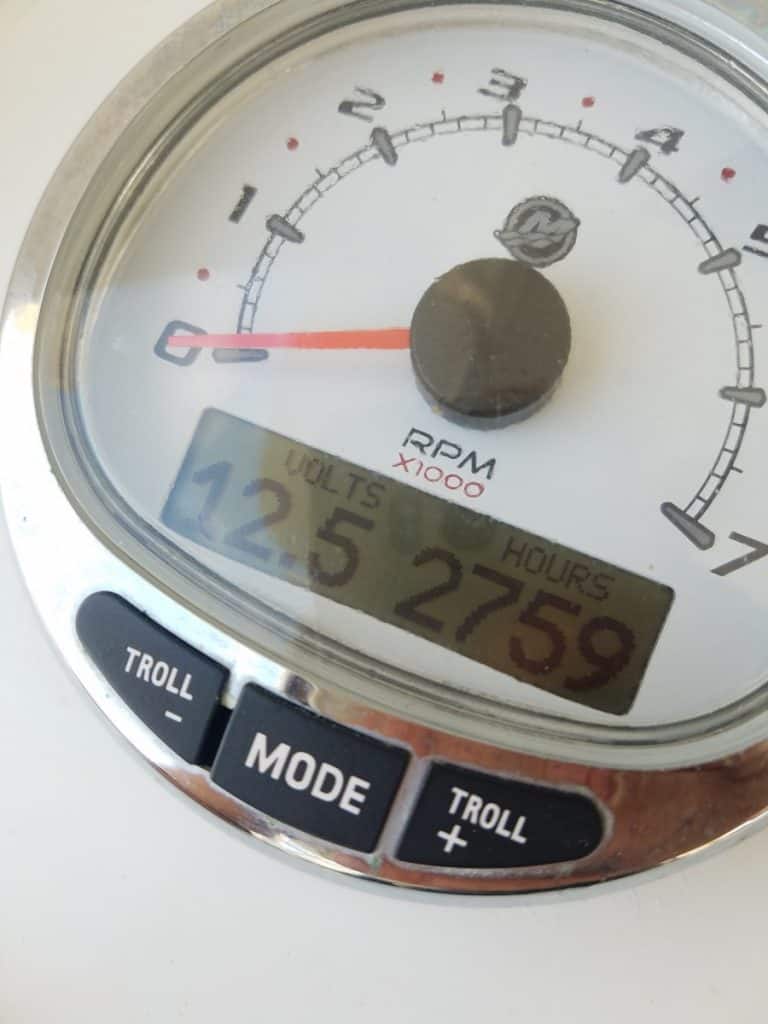
Well, if it was well maintained, stored, and taken care of. Then yes! You have found a great engine!
On the other hand, if it is 30-years old and only has 150 hours on it. But it was not well taken care of, stored, or maintained. Then you have an engine that isn’t worth any money, regardless of only having 150 hours.
This is why whenever most people ask the question of how many hours are a lot for a boat. We want to start with this information because they are really more concerned with the overall health of the engine.
Opposed to just wanting to know what number is low and which is a lot. Without knowing what kind of condition the engine is in, then the number of hours doesn’t really tell us much.
Now under great condition, and dealing with a four-stroke outboard. A lot of hours, when it comes to a number, is usually around 3-4K hours. That is what is considered a lot.
How Many Hours Is Average For A Boat?
This amount of hours is also what we would consider average. But in order to determine the average. We will need to go back to the condition issue of the engine.
Because we need to figure out what the question really is here. The average as far as how long do they last or the average for how many hours are put on a year? Or the average for when is it time to sell?
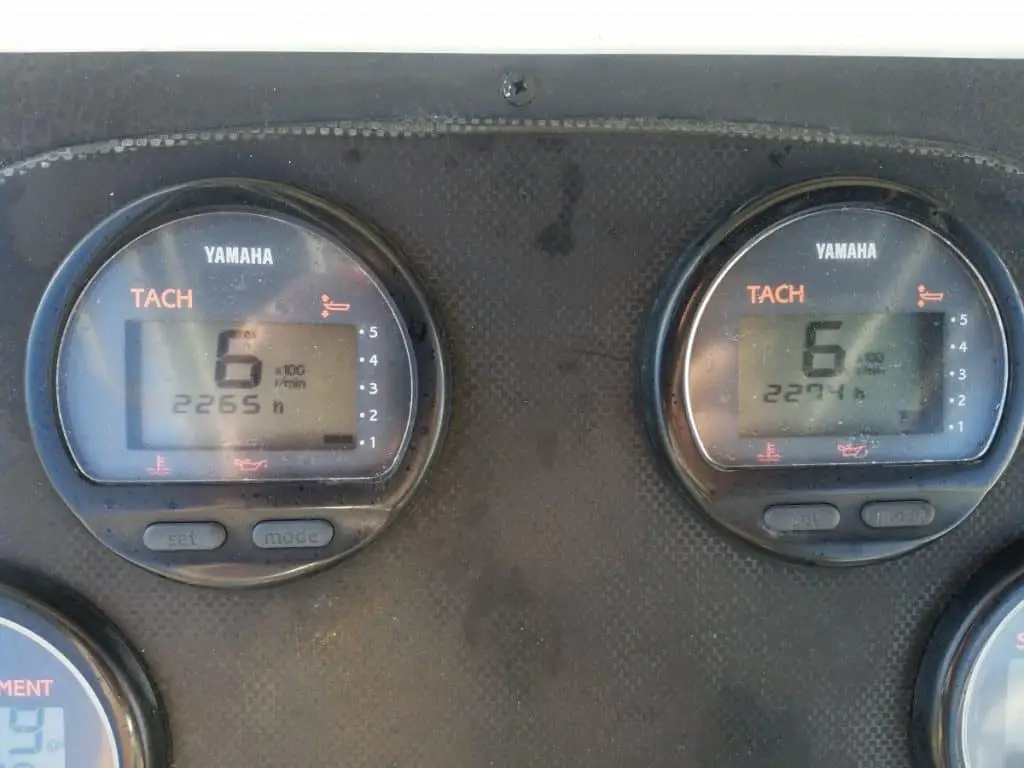
There are many averages to be discussed when talking about engine hours on a boat. The factors will range also depending on the owner of the boat as well!
The use of the engine and the location. For boats that live in Florida and get used regularly, we would say that the average number of hours for a boat will be around 2,000 hours.
That is just the average number of hours that are going to be on a 5-10-year-old engine that has been used regularly throughout the years. Now when it comes to the longevity of the engine hours though. We are more asking:
How Many Hours Does A Boat Engine Last?
This question will bring us back to the condition issue we keep going to. You can probably see by now, that a lot of the questions surrounding the engine hours of a boat.
Have to deal with the condition and care of the engine! This is why we have a dedicated article on How To Get More Hours From Your Boat’s Engine, With Fewer Breakdowns!
When an engine is taken care of, and especially most of the newer engines. We have seen engines in the upper thousands. I’m talking about 6, 7, and 8,000-hour ranges!
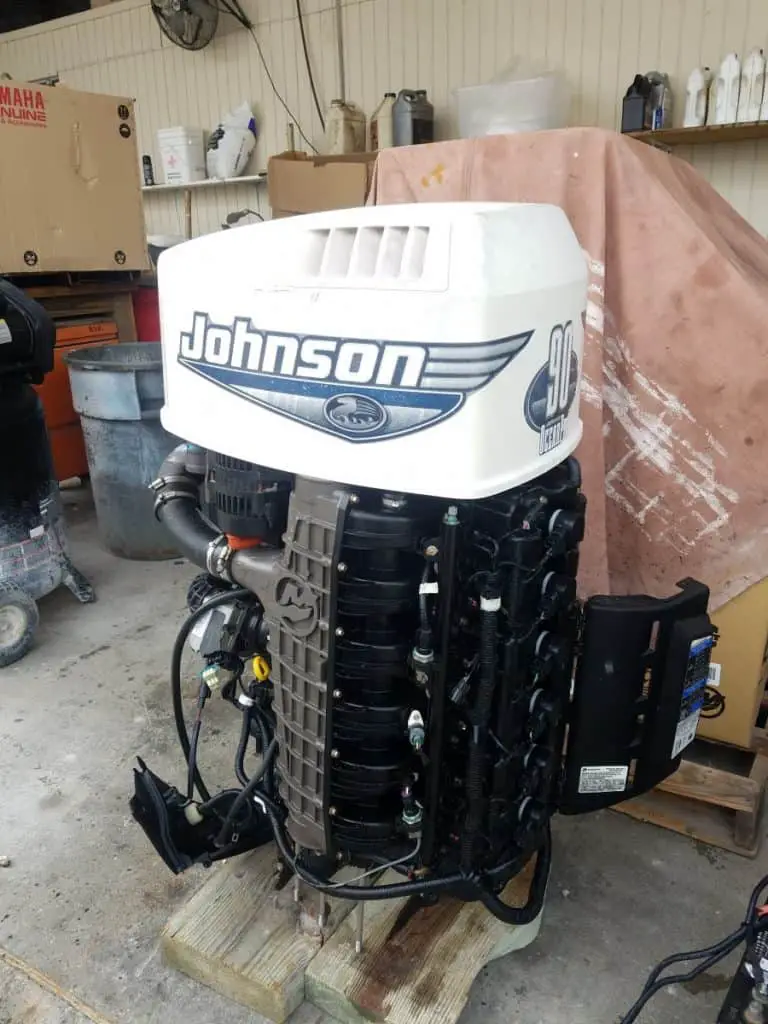
There are other engines that are used on a regular daily basis. Like the engines on the Coast Guard, FWC, and boats used at Walt Disney World! That will get upward towards 10, 11, and even 12,000-hours!
The 12,000-hour mark engines are smaller engines used at Walt Disney World. I think those were 60 HP Mercury’s!
In the recreational world though, where we don’t put 12-16 hours a day on the engine. Outboards will generally last 3-4K hours and that is also to the 20-year old engine range!
Can You Convert Hours To Miles?
This question seems to come up quite a bit when we talk about the engine hours of an outboard. So, if you ask us, in our opinion, there isn’t a really good way to convert and compare them!
But, if you wanted to, with a lot of speculation. You could say that 1 hour is like 100 miles. That seems to be the fairest and most average way of converting the hours.
That would mean 1,000 hours would be like having 100,000 miles on your car or truck. Most cars and trucks these days will get up into the 200, 300, and even to the 400,000-mile range.
For a gas-powered engine. But at the same time, once you hit the 300,000-mile mark. This is when we are usually bragging about how many miles our vehicle has!
So, you could say the same thing for your boat’s engine. Once you hit the 3-4K hour range. You can brag about how many hours you have racked up on the water!
Check Us Out!
Now that you know all there is to know about boat engine hours. Here are some other articles that you will find really helpful and informational!
Seasonal Trailer Maintenance: Avoid Being Stuck On The Road!
How Long Do Boat Batteries Last? And How to Make Them Last Longer!
How To Tie Up A Boat! Don’t Wake Up With it Underwater!
If you’ve got any questions or comments, let us know by subscribing to our YouTube Channel!
And if you would like to support us to continue bringing you great content, please click the link below to Amazon where we get a commission from anything you are already going to buy!
Click Here To Amazon!
And you can also donate by clicking the donate button here or on the right hand of the screen!
It really helps us out and we thank you so much for your support!
Thanks for reading and we look forward to reading your responses and comments.
We’d also like to invite you to check us out on Our YouTube Channel! We create all kinds of how-to and DIY videos to help you learn more and more about your boat. And how it works!

